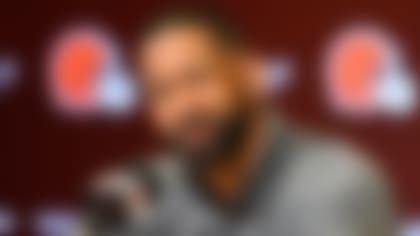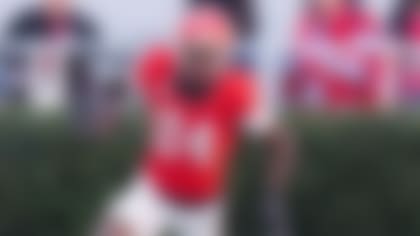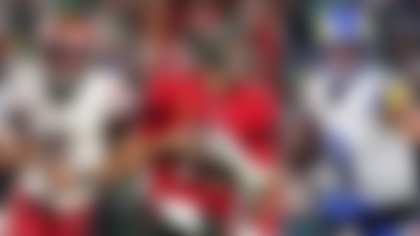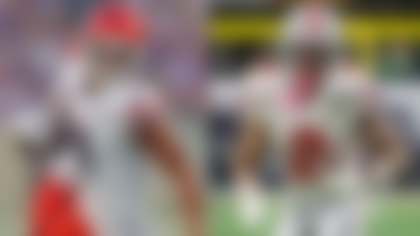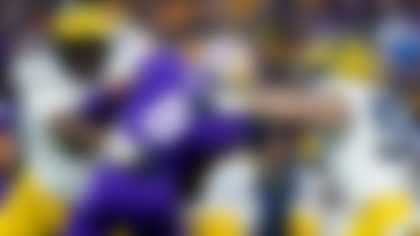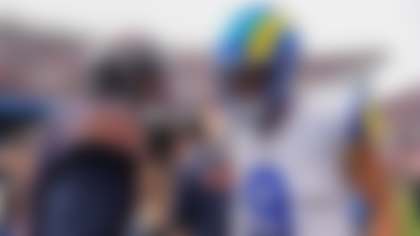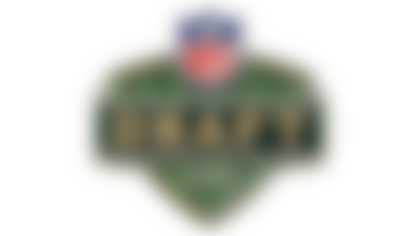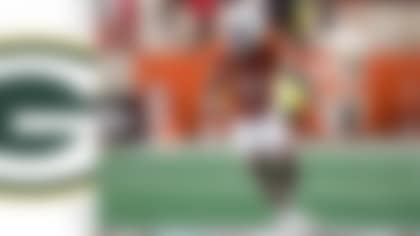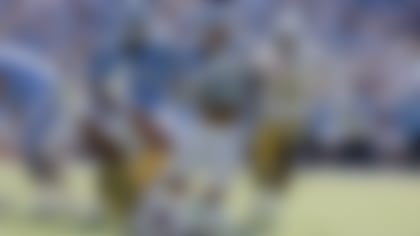NEW ORLEANS -- The Saints had experienced so much hardship over the previous two years -- losing in the playoffs on an improbable last-play touchdown in Minnesota, then on a blatant pass interference that was not called against the Rams -- that seemingly everyone in the organization was searching for a way to turn those negatives into a positive entering this season. Like the rest of the coaching staff, defensive coordinator Dennis Allen thought long and hard before settling on a simple yet poignant slogan.
"Good to great," he said to his players. "Let's go from good to great."
The words seemed to ring hollow the first two weeks, as his unit struggled in a win over the Texans and a loss to the Rams. But just when things seemed bleakest, after future Hall of Fame quarterback Drew Brees injured his thumb and was lost for at least a month following surgery, Allen stood before his charges and reminded them of the objective.
"Good to great -- what better opportunity to do that than right now?" he said.
Sunday night in the Superdome, before a national TV audience and a deafening crowd, the Saints' defense took a major step toward the goal. Facing a Cowboys team that had scored at least 31 points in each of its first three games, all victories, New Orleans shut it down en route to a 12-10 victory that surprised everyone but the individuals in the home locker room.
"We got a good group," linebacker Demario Davis said. "The leadership is strong in this locker room. The chemistry between this team, the culture -- everything is right. Every week we know that every game is going to look different. We know that no matter who the opponent is, it's more about us, and that's what we focus on, doing what we have to do to be successful. Defensively it's finding a way to create takeaways, being great in the run game and getting off the field on third down."
Takeaways: The Saints (3-1) recovered two fumbles, both by safety Vonn Bell, and intercepted Dak Prescott once.
Run game: They held a Dallas offense that had run for at least 200 yards in back-to-back games -- with a pair of 100-yard rushers the previous week -- to just 2.3 yards per carry and 45 yards on 20 rushes.
Third down: They stopped Dallas on 7 of 11 tries.
These are not the Saints we have come to know since Brees and coach Sean Payton linked up in 2006. They were top 10 in scoring in 11 of the past 13 seasons, including eight seasons in the top five, six in the top three and two occasions when they ranked No. 1. There was a synergy between player and play-caller that defied description at times. Payton provided the canvas, Brees the paint, and the two collaborated on some of the greatest art the NFL has seen.
But that will not be the case with Teddy Bridgewater -- which is no knock on him. Players of Brees' caliber do not come along every season or every decade. He's special. Bridgewater is capable, but there are limits to his game. And the fact that he had not started a meaningful game since 2015 before taking over for Brees two Sundays ago in Seattle was not lost on anyone in the New Orleans locker room.
Fact is, he and Payton are a work in progress. The bold, aggressive coach acknowledged Sunday that he is still adjusting to a new signal-caller and how to put him in the best positions to be successful.
"I get angry at myself because it starts with me, relative to things, maybe, that we are putting in that we think will be easily replicated," Payton said. "Yet we get in the game and recognize there are some challenges. it is a different group. It's different than a year ago. WE have to adjust a little better. I think that really starts with me."
Payton was particularly critical of himself for calling a pass play in the final two minutes with just under two minutes to play and the Saints at the Dallas 31-yard line. The call, on third-and-8, ultimately resulted in Bridgewater being unprotected on the back side, which led to a sack that took the Saints out of field-goal range.
"I put him in a tough position there," the coach said.
Fortunately on this night, the New Orleans defense was up for the challenge. It had been a bumpy ride to Sunday. In Week 1, the unit was given a lead with 50 seconds to play only to allow the Texans to go 75 yards in two plays and 13 seconds for the go-ahead score. The offense bailed the group out, however, by driving for the decisive field goal.
The next week at Los Angeles, the Saints gave up scores on four series that bridged the second and third quarters in what turned out to be a 27-9 loss that was made worse by the injury to Brees. And even though the unit played well the next week at Seattle, it surrendered 20 fourth-quarter points to turn a comfortable 19-point lead into moments of anxiety.
But the group was on point from the start against Dallas (3-1). It clogged running lanes and made aerial stops when necessary. It also forced two fumbles, one at the Dallas 31 and the other at the Dallas 43 with under two minutes to go in the first half and the Saints leading, 6-3. It appeared running back Ezekiel Elliott's elbow was down before the fumble, which occurred on fourth-and-1, but the play was not overturned on review. New Orleans then drove for a field goal as time expired.
Overall, the Saints held Prescott to his worst showing of the season. He had thrown for multiple scores in each of his first three games, but was shut out with one turnover Sunday. Elliott had rushed for at least 100 yards in each of the previous two games and had averaged at least 4.1 yards per carry in every game, but was held to a season-low 35 on 18 carries. His 1.9 yards per carry was a career low for games in which he had at least 10 rushes.
This is the way the Saints are going to have to win while Brees is out, with complementary football and contributions from everyone. "Good to great" is not just a slogan, it is a philosophy that the defense has embraced and internalized.
"When you talk about defense going from good to great, that's everything you want to personify," defensive end Cam Jordan said. "You always look for perfection and strive for perfection. At the end of the day, it's all about that next step. Good to great is that we had three turnovers but potentially could have had four if I had gotten my hand in there a little bit faster and gotten a sack/strip/fumble. Good to great is converting one more turnover into a touchdown. Good to great is being the best you can be. It's something you strive for every week."
On Sunday, the Saints' defense finally hit its stride. The challenge now is to maintain it.
Follow Jim Trotter on Twitter _@JimTrotterNFL_.



